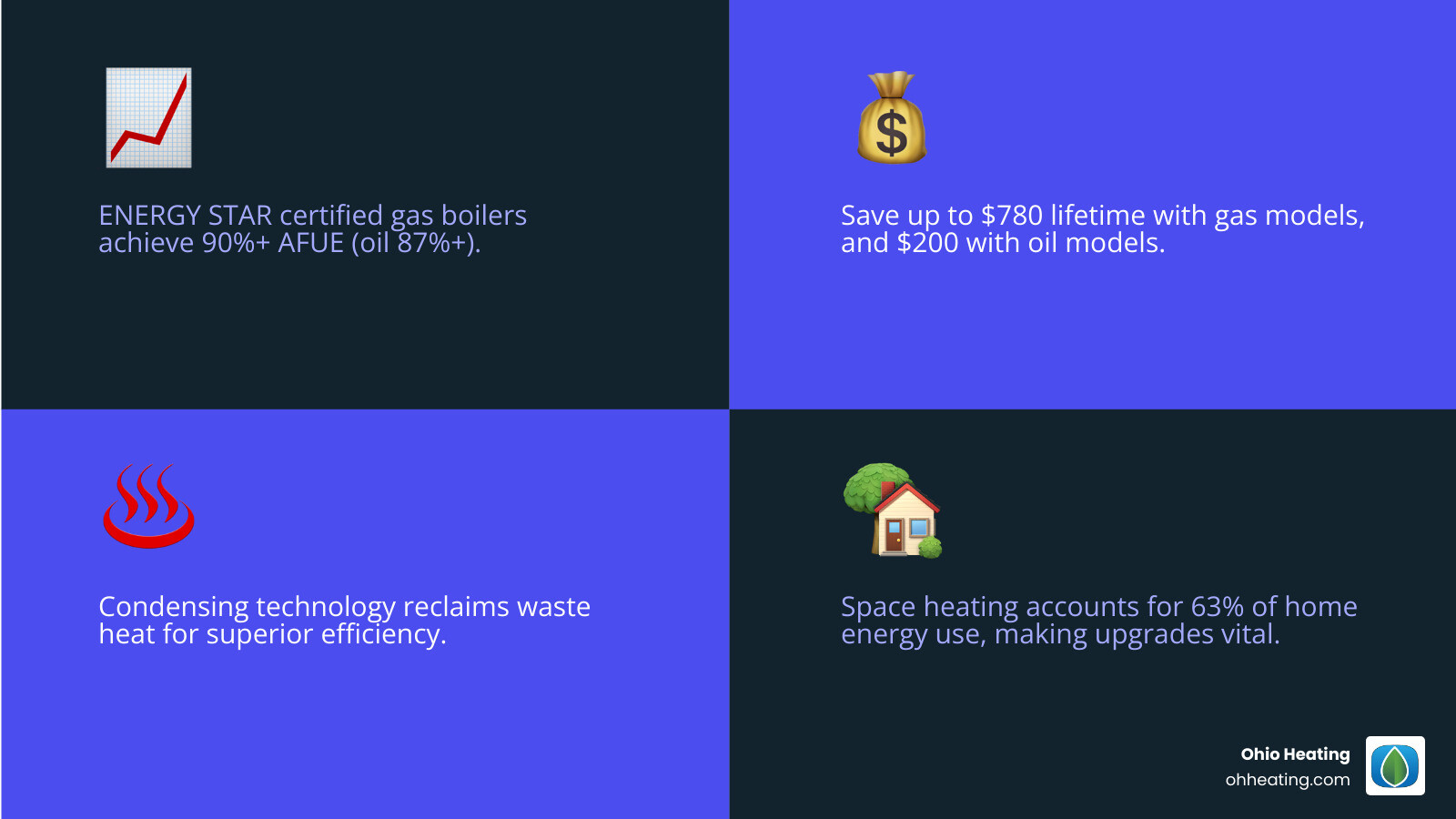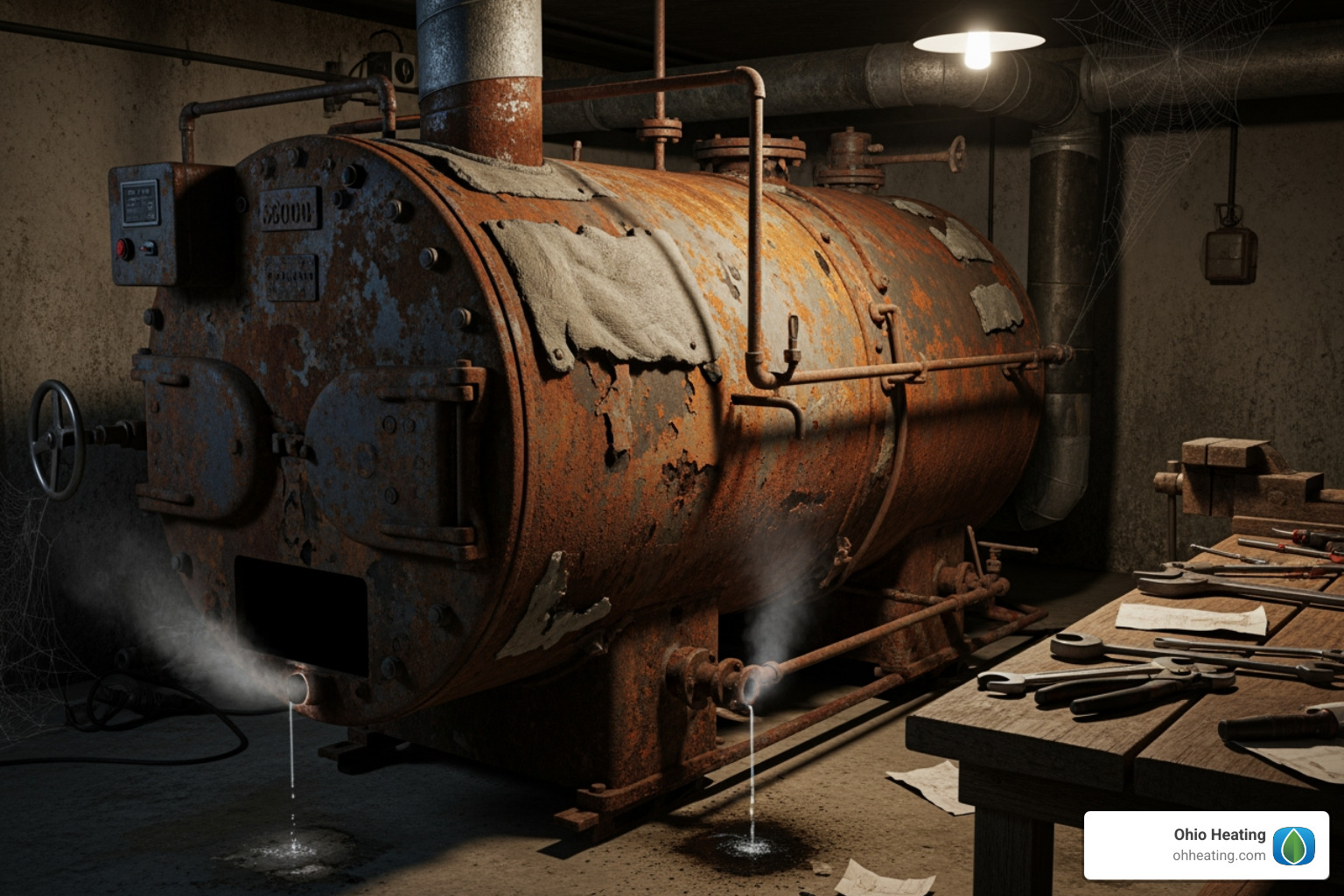Energy efficient boilers: Top Savings
Why Your Home’s Heating Bill Is Draining Your Budget
Energy efficient boilers are modern heating systems that convert 90% or more of their fuel into usable heat, unlike older models that can waste 20-30% of energy. Here’s a quick overview:
Top Benefits:
- ENERGY STAR certified gas boilers achieve 90%+ AFUE (Annual Fuel Utilization Efficiency)
- ENERGY STAR certified oil boilers achieve 87%+ AFUE
- Save $780 lifetime with gas models, $200 with oil models
- Use 10% less energy (gas) or 4% less energy (oil) than standard units
Key Technologies:
- Condensing boilers recycle waste heat through secondary heat exchangers
- Electronic ignition eliminates constantly burning pilot lights
- Sealed combustion uses outside air for safer, more efficient operation
If your heating costs climb every winter, you’re not alone. Space heating accounts for 63% of a home’s total energy use, making it the single biggest opportunity to cut utility bills. For property managers and business owners, an inefficient boiler is an expensive liability that threatens tenant comfort and property value.
Today’s ENERGY STAR certified boilers offer a proven path to lower costs. They achieve efficiency ratings between 90-98%, meaning nearly every dollar you spend on fuel heats your building instead of disappearing up the flue. Upgrading from an old boiler to a modern, efficient model can lead to significant annual savings. We consistently see these reductions for our customers in Columbus and Central Ohio.
This guide will break down the top ENERGY STAR boilers, explain what makes them efficient, and help you choose the right model for your property.

What Are the Benefits of Energy Efficient Boilers?
While the initial question is often about savings, our customers quickly find that the benefits of a new energy efficient boiler go far beyond the monthly utility bill.
Lower energy bills are the primary motivator for an upgrade. Modern systems extract maximum heat from every unit of fuel, wasting far less up the flue. An ENERGY STAR certified gas boiler can save around $780 over its lifetime, while certified oil boilers save about $200. These models use 10% less energy (gas) and 4% less (oil) than standard units, and those savings add up over the boiler’s lifespan.
The comfort difference is immediate. Older boilers often create annoying temperature swings. Modern energy efficient boilers, especially those with modulating burners, adjust their output to match your home’s needs. This provides steady, even warmth without the constant on-off cycling that drives up costs.
The environmental benefits are also significant. Burning less fuel to produce the same amount of heat directly reduces greenhouse gas emissions. It’s a choice that’s good for the planet and your wallet.
An energy efficient boiler is an investment that pays dividends. While the upfront cost may be higher, the long-term savings on fuel and repairs often lead to a quick payback period. Don’t overlook the potential for government rebates and incentives, which can lower your initial cost. You can find rebates for certified products on the ENERGY STAR website.
An energy efficient boiler delivers lower bills, better comfort, a smaller environmental footprint, and long-term peace of mind.

Decoding Boiler Technology: AFUE, ENERGY STAR, and Condensing Systems
Understanding a few key concepts will help you make a confident decision that saves you money. Let’s walk through the essentials.
What is an AFUE Rating?
Every boiler has an AFUE rating, or Annual Fuel Utilization Efficiency. This percentage tells you how much of the fuel you buy is converted into heat for your home. An 80% AFUE rating means 80 cents of every dollar heats your home, while 20 cents is wasted. A 95% AFUE boiler wastes only 5 cents per dollar.
- Mid-efficiency boilers range from 80-88% AFUE.
- High-efficiency boilers achieve 90-98% AFUE.
The higher the AFUE, the less fuel you’ll burn to stay comfortable. For more details on how AFUE impacts costs, this resource offers a helpful breakdown.
Understanding the ENERGY STAR Standard
The ENERGY STAR label signifies that a boiler meets strict efficiency standards set by the U.S. EPA. It’s a simple shortcut to finding a quality, energy efficient boiler.
For ENERGY STAR certified boilers, the requirements are:
- Gas boilers: Minimum AFUE of 90%
- Oil boilers: Minimum AFUE of 87%
Choosing a certified model translates to significant lifetime savings—around $780 for a gas boiler and $200 for an oil boiler compared to standard models. The label does the homework for you, guaranteeing proven energy savings.
Condensing vs. Conventional Boilers
This is the key technological difference in modern boilers.
Conventional boilers burn fuel to heat water and send hot exhaust gases up the flue, wasting a significant amount of heat.
Condensing boilers are smarter. They use a secondary heat exchanger to capture heat from the exhaust gases before they escape. This process cools the gases enough for water vapor to condense, releasing trapped “latent heat.” This recycled heat is used to help warm your system’s water, essentially getting a second round of heat from the same fuel. This is why condensing boilers routinely achieve efficiency ratings of 90% or higher. The technology works, and it’s the gold standard for modern heating. For a deeper look, check out this guide on high-efficiency boiler science.
How to Choose the Right Energy Efficient Boiler for Your Home
Finding the right energy efficient boiler isn’t about chasing the highest efficiency number. It’s about matching a system to your home’s needs, hot water usage, and existing setup. Let’s walk through the key choices.
Boiler Types Explained: Combi, System, and Heat-Only
- Combi (Combination) Boilers: These compact units provide both central heating and on-demand hot water directly from the main water line. They are ideal for smaller homes with one or two bathrooms because they don’t require a storage tank. However, simultaneous heavy use (like a shower and a washing machine) can affect water pressure.
- System Boilers: These work with a separate hot water storage cylinder, making them perfect for larger homes with multiple bathrooms. They can supply hot water to several taps at once without a drop in pressure, but they do require space for the cylinder.
- Heat-Only (Regular) Boilers: Common in older homes, these systems use both a hot water cylinder and a cold water storage tank (often in the attic). If your home already has this setup, choosing a new heat-only boiler can be the most cost-effective replacement, as it uses the existing pipework.
Learn more about how these systems work on our page about residential boilers.
Sizing Your Boiler: Why Bigger Isn’t Always Better
Properly sizing a boiler, measured in BTUs (British Thermal Units), is critical. An oversized boiler will cycle on and off frequently, wasting energy and causing premature wear. An undersized boiler will run constantly without adequately heating your home.
The correct size is determined by a professional heat loss calculation. This considers your home’s square footage, insulation quality, window type, local climate, and layout. Guessing at the size is a costly mistake that leads to years of high bills and discomfort. Professional sizing is essential, as detailed in our boiler installation insights.
Fueling Your Savings: Gas vs. Oil
Your fuel choice impacts operating costs and convenience. In Ohio, there are three main options:
- Natural Gas Boilers: The most popular and typically cheapest option in Columbus if a gas line is available. Modern ENERGY STAR certified gas boilers are highly efficient (90%+ AFUE) and burn cleanly.
- Oil Boilers: A good choice for rural homes without gas access. Today’s ENERGY STAR certified oil boilers reach 87%+ AFUE, but oil prices can be volatile, and you’ll need an on-site storage tank.
- Propane Boilers: An efficient alternative for homes without natural gas. Propane requires a storage tank, and its cost usually falls between natural gas and oil. It allows for high-efficiency heating in areas without gas infrastructure.
Is It Time for an Upgrade? 7 Signs You Need a New Boiler
An old boiler can quietly drain your wallet through inefficiency and mounting repair costs. Knowing when to replace your boiler instead of repairing it can save you money and prevent a mid-winter breakdown. Here are seven common signs it’s time for an upgrade to a modern energy efficient boiler:

- Your boiler is over 15 years old. Efficiency declines with age. A system past the 15-year mark is likely a mid-efficiency model at best, and upgrading could dramatically cut your heating costs.
- Rising energy bills. If your heating costs are climbing without a change in your habits, your boiler is likely losing efficiency and burning more fuel to do the same job.
- Frequent and costly repairs. If you’re calling for service every season, you may be spending more on repairs than a new, reliable system would cost over time.
- Strange noises. Whistling or rumbling (“kettling”) often indicates limescale buildup, while banging or gurgling can point to more serious internal problems and declining efficiency.
- Visible leaks or corrosion. Water pooling around your boiler or rust on its exterior are serious signs of internal deterioration that will only get worse.
- A yellow pilot light instead of blue. A yellow or orange flame indicates incomplete combustion and a potential carbon monoxide risk. This is a safety hazard that requires immediate professional attention.
- Inconsistent heating. If some rooms are cold while others are too hot, or radiators heat unevenly, your boiler can no longer distribute heat effectively.
If you recognize these urgent boiler repair signs, it’s time to consider a replacement. An inspection can determine if repair or replacement makes the most sense for your budget.
Maximizing Your Investment: Professional Installation and Maintenance
An energy efficient boiler is a smart investment, but its performance depends on professional installation and ongoing maintenance. These two factors are critical to achieving the savings and reliability you expect.
The Crucial Role of a Professional Contractor
Your new boiler is only as good as its installation. An improperly installed unit will underperform, fail to reach its advertised AFUE rating, and can pose serious safety risks.
- Safety and Compliance: Boilers involve combustible fuels, high pressure, and electrical systems. Our licensed and insured technicians in Columbus, OH ensure every installation meets local codes and manufacturer specifications, protecting your property from risks like carbon monoxide leaks or water damage.
- Peak Efficiency: Incorrect venting, calibration, or pipe connections can rob you of efficiency. A professional ensures your new boiler is integrated correctly with your existing infrastructure to operate at its peak from day one.
- Expert Sizing and Selection: As discussed, a pro performs a detailed heat loss calculation to select the right size and type of boiler for your home, preventing the issues caused by oversized or undersized units.
When choosing an installer, look for a licensed, insured, and experienced local company. For businesses, reliable heating is crucial for operations, which is why we offer specialized boiler care for businesses and ensure our contractors are WSIB registered where applicable.
Keeping Your Boiler in Peak Condition
Annual maintenance is the key to open uping your boiler’s full potential and lifespan. It catches small problems before they become emergencies, maintains peak efficiency, and extends the life of your unit to 15 years or more.
Between professional visits, you can bleed air from radiators and check the pressure gauge (it should be 1-1.5 bar when cold). However, professional service is essential. During an annual visit, our technicians inspect the burner for safe combustion, clean heat exchangers, test safety controls, check system pressure, and look for leaks or corrosion. We also provide expert burner service and replacement and conduct pressure testing and inspections to verify system integrity.
Regular maintenance isn’t an expense—it’s an investment in longevity, reliability, and sustained energy savings.
Frequently Asked Questions about High-Efficiency Boilers
Here are answers to some of the most common questions we hear from customers considering an energy efficient boiler.
How much can I save with an ENERGY STAR certified boiler?
According to national averages, an ENERGY STAR certified gas boiler can save approximately $780 over its lifetime, while a certified oil boiler can save about $200. Your actual savings will depend on your home’s efficiency, local fuel costs, and how harsh our Ohio winters are. However, the savings are most dramatic when replacing a boiler that is 15-20 years old, and we consistently see significant bill reductions for our Central Ohio customers.
How long does an energy-efficient boiler last?
With professional installation and annual maintenance, a modern high-efficiency boiler typically lasts 15 years or more. Regular service is the key to longevity. A neglected energy efficient boiler will lose efficiency and fail sooner than one that receives annual check-ups to catch small issues before they become major problems.
What’s the difference between a boiler and a furnace?
Though the terms are sometimes used interchangeably, they are very different systems.
- Boilers heat water and circulate it through pipes to radiators, baseboard heaters, or in-floor radiant systems. This is known as hydronic heat and does not use ductwork.
- Furnaces heat air and distribute it through a network of ducts to vents throughout the home. This is known as a forced-air system.
The type of heat distribution in your home (radiators vs. vents) determines whether you need a boiler or a furnace.
Conclusion: Warm Up to Savings with an Efficient Boiler
Choosing the right heating system is a critical decision for your home or business. As we’ve covered, modern energy efficient boilers offer a clear path to lower utility bills, improved comfort, and a smaller environmental footprint. With efficiency ratings of 90-98%, ENERGY STAR certified boilers ensure your fuel dollars are spent on heating your space, not wasted up the flue.
These savings, which can average $780 for gas models and $200 for oil models over the system’s lifetime, are paired with the benefit of consistent, reliable warmth. However, even the best boiler requires professional installation and regular maintenance to deliver on its promises.
At Ohio Heating, we’ve been ensuring the comfort and operational reliability of homes and businesses in Columbus and Central Ohio since 1999. We understand that a heating system is about your budget, comfort, and peace of mind. Our team guides you through every step, from selecting the right boiler to expert installation and maintenance.
Ready to stop wasting money on an inefficient system? Let’s talk about how an energy efficient boiler can transform your property. Contact us for boiler sales and service today to take the next step toward a warmer, more efficient future.

